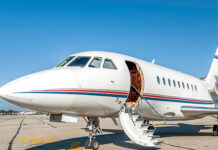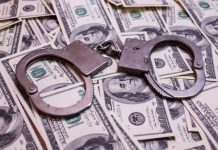
LAKEWOOD – Millions of fans can’t be wrong.
In 19 regular seasons, the Lakewood BlueClaws attracted 7,711,681 fans to regular-season home games at FirstEnergy Park.
Now in their first year as the Jersey Shore BlueClaws, the team is a major reason Lakewood is New Jersey’s unofficial capital of professional baseball as they are the third club to play The Grand Old Game in the town.
Flash back to the 1940s
On a bright, sunny day in March of 1943, more than 1,200 folks descended on the downtown train depot in Lakewood. The turnout wasn’t for the grand opening of a hotel in the winter resort nor was it to see heavyweight boxing champion Joe Louis train for his fight against Max Schmeling with runs around Lake Carasaljo. It was an auspicious, warm welcome for the New York Giants.
World War II raged.

Keneshaw (Mountain) Landis, then the commissioner of Major League Baseball, ordered its 16 teams to train north of the Mason-Dixon Line to conserve gasoline, oil, rubber and other essentials for the war effort.
The New York Giants, now the San Francisco Giants, wound up at the John D. Rockefeller Estate, now known as Ocean County Park. Judge Harry E. Newman, then an Ocean County Freeholder, wrote a Jan. 7, 1943 letter to team owner Horace Stoneman, inviting the Giants to train in Lakewood.
The Giants trained at the estate from 1943-45. Among their players were future National Baseball Hall of Fame members Mel Ott, Carl Hubbell, Ernie Lombardi and Joe (Ducky Wucky) Medwick.
The diamond was carved on one of the estate’s nine-hole golf course fairways. New York’s top farm team, the Jersey City Giants, trained on the diamond in 1944-45.
Move ahead to 1998. Something special – the birth of the Lakewood BlueClaws (now the Jersey Shore BlueClaws).
A major backer of the birth of the BlueClaws was Robert Singer, R-30th, state senator and a member of the Lakewood Township Committee. The first talk began early in 1998 when Singer was contacted by the local owners of a New York-Penn League team based in Watertown, N.Y. The Getzler family – Stan, Phyllis and Joseph – hoped to bring the team from upstate New York to Monmouth County where the family had a home. The team wound up on Staten Island, N.Y., where it was a New York Yankees affiliate for many years.
A group of investors known as the American Baseball Company teamed with Singer and other Lakewood officials to place a team in Lakewood.
Once upon a time, the large parcel of land at New Hampshire and Cedar Bridge avenues consisted primarily of sand, scrub oak and scrub pine. In less than one year, the land became home to a stadium, FirstEnergy Park, that cost an estimated $22 million to build. The Urban Enterprise Zone and the investors financed the stadium. The BlueClaws’ owners contributed $2 million to the ballpark’s construction, bringing their total investment to the team – after the $3.5 million purchase price and other various relocation and start-up costs – to $8 million.
Ground was broken on a rainy day with the temperature in the low 40s on April 17, 2000. It took just 359 days to build the stadium. The facility was dedicated as the Lakewood Municipal Baseball Stadium. It became known as GPU Energy Park, now FirstEnergy Park.
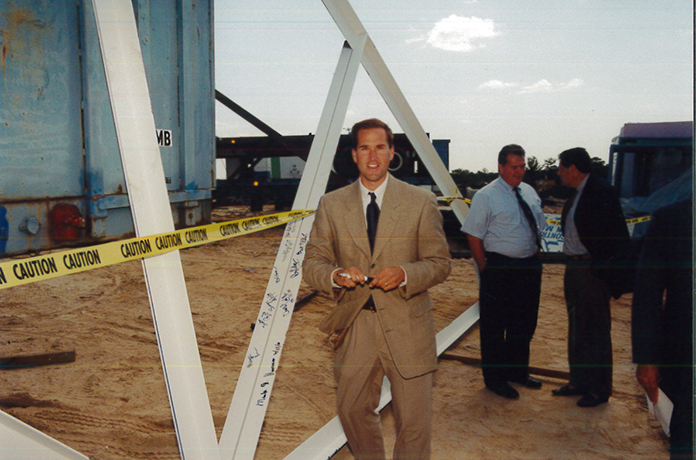
The team, which will open its regular season Tuesday, May 4, at 7:05 p.m. when it hosts the Hudson Valley Renegades, a New York Yankees farm club, in Hi-A East League action, set up shop in office space Feb. 1, 2000 on nearby Airport Road in Lakewood, site of its initial tickets promotion. The event took place on a Saturday. The first person to buy a ticket was Lakewood resident Rich Furrer. He began waiting in line at around 2 p.m. on Friday with hundreds of other fans for more than 20 hours. As the temperature fell, fans kept warm with heaters and grills.
“It rained on me, it hailed on me and it snowed on me,” said Furrer, who died at the age of 51, prior to the team’s first game as the Philadelphia Phillies’ low Class A farm club in the South Atlantic League, “but I was first.”
The BlueClaws were named by Matt Koscielski, a 9-year-old from Wall Township’s West Belmar section. He won a ‘name the team’ contest that consisted of local elementary schools. BlueClaws was the most popular entry so team officials went with it. Now that the team had a name, it began its marketing effort.
“I think the biggest challenge was convincing the people who weren’t necessarily baseball fans that the product we were putting out was more than a baseball game,” said Mike Ryan, the team’s director of marketing from 2000-2011. “In subsequent seasons, it was easier because we had examples, but the first year was a fresh slate. Luckily, we seemed to be able to use a lot of what Trenton (Thunder, then the Yankees’ Double A affiliate in the Eastern League) had done as an example.
“For me, the biggest challenge was learning the concept of minor league sports and the selling factors. I was one of the few employees who did not come from a sports background. One of the reasons I was hired was my local knowledge, connections and business experience. Being an avid sports fan, minor-league teams were attractive to me to attend because of the game itself. I had been to many Buffalo Bisons (baseball), Thunder and Trenton Titans (ice hockey) games because I love sports. Learning the marketing strategies that minor-league teams use to attract non-sports specific fans was my biggest learning curve.”

The BlueClaws’ first slogan was Great Family Entertainment Just Got Closer to Home.
“We billed the experience as family entertainment featuring baseball, not baseball featuring family entertainment,” Ryan said. “Families were our base. We understood that in a family of four maybe only one or two of them were baseball fans so we wanted to make sure they understood there was something for each of them at the ballpark. Whether it was the inflatables, the outfield bar or the boardwalk style arcade, nobody would be bored. We tried a lot of things and stuck with what worked when it came to advertising. I was willing to listen to anyone who brought in a unique idea. Some things worked great and others not so much.”
There were clear plans to market the team.
“The two main objectives in year one was brand awareness, which we accomplished with billboards, static ads in the newspapers and magazines and other semi-permanent locations ” Ryan said. “Then, as the season approached, we would market each homestand as its own entity in the newspapers and on the radio. We even found that flying banners at the beach were being noticed and we could market individual evening games. People would call from their beach chair to order tickets when they saw a banner fly letting them know that evening’s promotion.”
The BlueClaws played their first regular-season game April 5, 2001 against the Kannapolis (N.C.) Intimidators, a Chicago White Sox farm club, It was a 5-1 loss, but it was a beginning. It took the BlueClaws five games to win their first game, a 9-7 conquest of the host Greensboro (N.C.) Bats, on April 9, 2001. Lakewood’s first home game, April 11, 2001, was suspended in the fourth inning because of rain after a two-hour delay. The game, a Lakewood loss, was completed the next day.
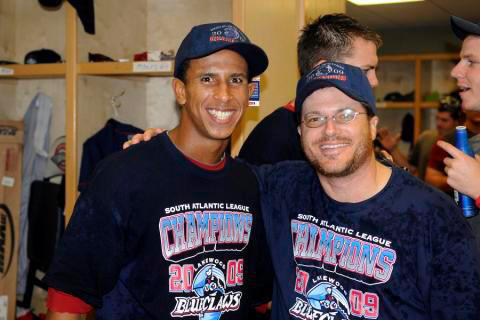
Its second home game resulted in a seven-inning no-hitter thrown by Keith Bucktrot and an 11-1 win over the Hickory (N.C.) Crawdads, a Pittsburgh Pirates affiliate, on April 12, 2001.
Lakewood was 28-42 in the initial half of its first season of play and 32-37 in the second half. It attracted 482,206 fans to FirstEnergy Park in the team’s first season.
“I can still remember our first opening day and hearing the call on the radio to open the gates,” Ryan said. “The second song the crew in the production room played was the theme from The Natural as the fans (7,512) were filing in. I literally got chills.”
Reggie Griggs hit Lakewood’s first home run in franchise history in 2001 in the BlueClaws’ third regular-season game.
The American Baseball Company sold the team to Shore Town Baseball. The new ownership was introduced July 27, 2017 – the same day the BlueClaws welcomed their seven-millionth fan. The BlueClaws accepted their Player Development License from the Phillies in February, becoming Philadelphia’s High-A East League affiliate. The license runs for 10 years.
Shore Town Baseball has made numerous improvements, led by a Biergarten featuring live music in back of the third-base line, a miniature golf course in back of right field and boardwalk style amusements beyond the outfield wall. They were installed prior to the 2018 season. The ABC installed a berm, luxury suites, picnic areas and a 1,859-square foot video board. The latter was installed prior to the 2015 season.
“I still have a sense of pride for what the original front office staff was able to accomplish,” Ryan said. “From top to bottom, we were full of great people who wanted this to succeed. And we accomplished that goal.”
A total of 106 players, including future Philadelphia stars Ryan Howard and Cole Hamels, landed berths on major-league regular-season rosters through the 2020 season. The duo led the Phillies to the championship of the 2008 World Series. Howard, who played for Lakewood in 2002, was its first player to land a berth on a major-league regular-season roster. He slugged .382 regular-season home runs and drove in 1,194 runs with the Phillies from 2004-16. He hit .258 lifetime.
Howard was a National League All-Star in 2006, 2009 and 2010. He was named the league’s Most Valuable Player in 2006 and its Rookie of the Year in 2005. He was named the MVP of the 2009 National League Championship Series. He paced the major leagues in homers in 2006 and 2008. He led the major leagues in runs batted in during the 2006, 2008 and 2009 seasons.
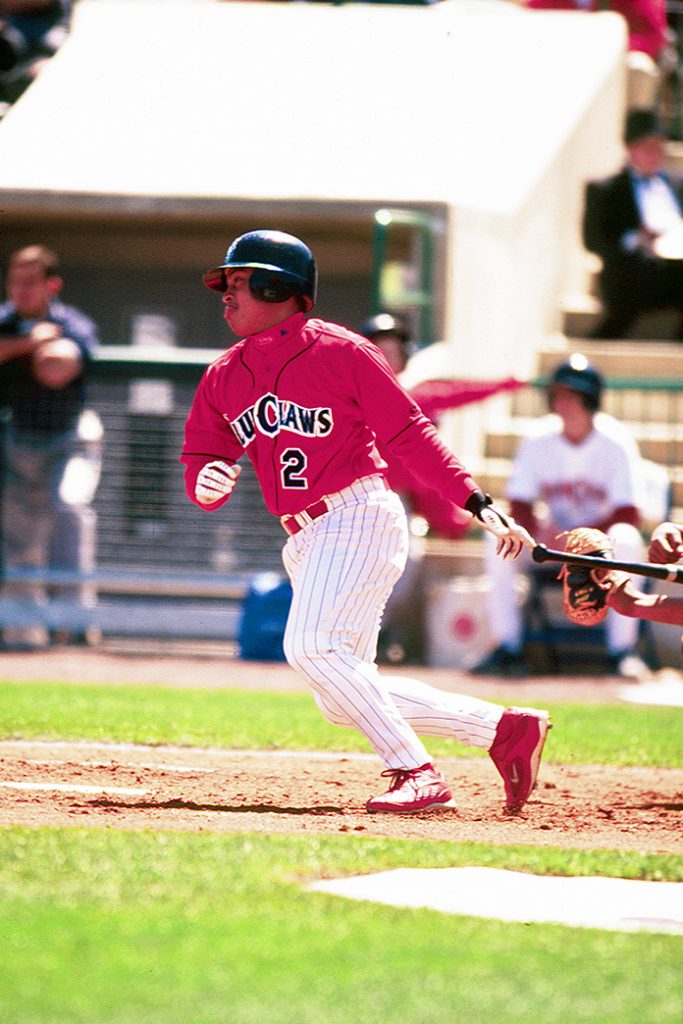
Nicknamed The Big Piece because of his 6-foot-4, 259-pound frame, the lefty-swinging first baseman was the fastest player in major-league history to hit 100 and 200 homers. He was drafted by the Phillies out of Missouri State University on the fifth round in 2001. His No. 29 jersey was retired by Lakewood during the 2010 season.
While playing for Lakewood on an injury rehabilitation stint, Howard hit a game-winning homer.
Asked if he was spoiled, Lakewood manager Steve Roadcap smiled and remarked, “The Phillies finally got me a cleanup hitter.”
Hamels, a left-handed starting pitcher, starred for Lakewood in 2003. He played for the Phillies from 2006-15. He also pitched for the Texas Rangers (2015-18), Chicago Cubs (2018-19) and the Atlanta Braves (2020).
A free agent at this writing, Hamels took a 163-122 lifetime regular-season record into 2021. He posted a 3.43 earned run average and struck out 2,560 hitters. He was a National League All-Star with the Phillies in 2007, 2011 and 2012. He was an American League All-Star with the Rangers in 2016. He was named the World Series MVP in 2008 and the NLCS MVP in 2008. He tossed a no-hitter in 2015 and combined on a no-hitter in 2014.
The Phillies’ starting catcher in 2008 was Carlos Ruiz, who was with Lakewood in 2001. He played for the Phillies (2006-16), the Los Angeles Dodgers (2016) and the Seattle Mariners (2017). He was a National League All-Star with the Phillies in 2012. The Phillies signed Ruiz as an amateur free agent in 1998 out of the Dominican Republic.
Selected by the Phillies out of San Diego’s Rancho Bernardo High School 17th overall on the first round, Hamels’ No. 19 Lakewood jersey was retired during the 2014 season.
Gavin Floyd was the first Lakewood pitcher to become a major leaguer, earning the distinction two days after Howard made it to The Show. Drafted fourth on the first round by the Phillies out of a Maryland high school, Floyd accepted a $4.2 million signing bonus from Philadelphia and played for Lakewood during the 2001 season.
The righty pitched for the Phillies (2004-06), the Chicago White Sox (2007-13), the Atlanta Braves (2014), the Cleveland Indians (2015) and the Toronto Blue Jays (2016). He posted a 74-76 record and a 4.37 lifetime earned run average, striking out 985 batters. He tossed Lakewood’s first nine-inning no-hitter in franchise history, losing 1-0 as the team made two sixth-inning errors. He was the first SAL pitcher since 1996 to suffer the loss in a no-hitter.
Former Lakewood players Alec Bohm and Rhys Hoskins have played starring roles with the Phillies. Bohm, a third baseman chosen third on the first round by Philadelphia in 2018, was second in the National League Rookie of the Year voting in 2020. Hoskins, a first baseman, has emerged as a slugger.
The BlueClaws won South Atlantic League titles in 2006, 2009 and 2010 and advanced to its championship series in 2016 and 2018.
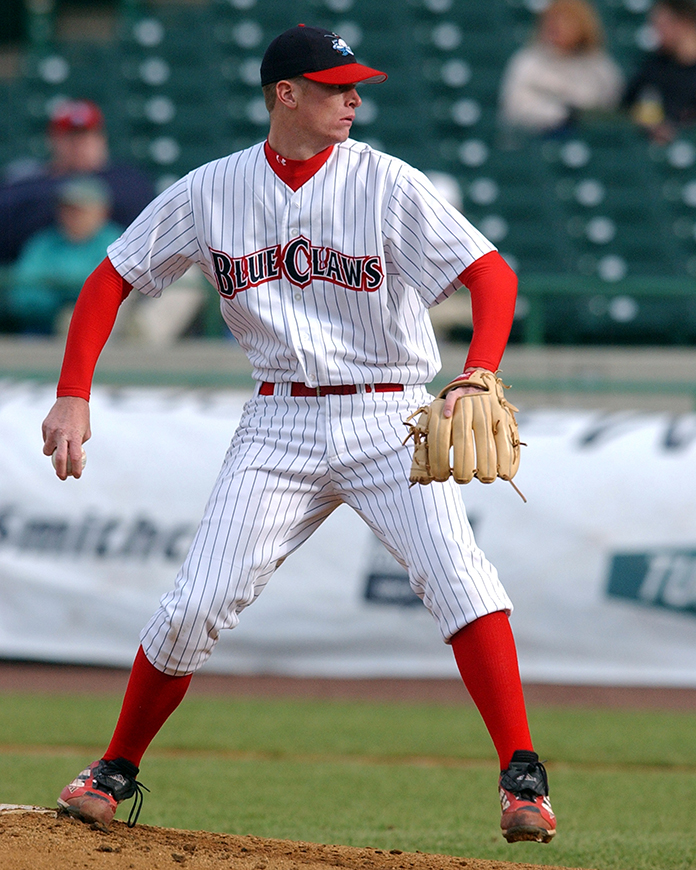
A total of seven 2006 players – Mike Zagurski, Kyle Kendrick, Josh Outman, Greg Golson, Lou Marson, Matt Maloney and Carlos Carrasco – wound up on major-league rosters. Earning berths on major-league regular-season rosters from the 2009 team were Justin DeFratus, B.J. Rosenberg, Anthony Gose, Tyler Cloud, Steve Susdorf, Travis d’Arnaud, Trevor May and Jake Diekman.
The 2010 players who made it to the major leagues were Darin Ruf, Jonathan Pettibone, Diekman, Jarred Cosart, Jonathan Villar, Josh Zeid, Jon Singleton, Trevor May and Domingo Santana.
Philadelphia third base coach Dusty Wathan managed Lakewood. Former Lakewood manager Jeff Manto coached the lefty swinging Howard in hitting in 2002.
“I told Ryan, ‘You can be a special home run hitter if you learn to hit the ball to left field,’ “Manto said. “Ryan answered, ‘How do I do it?’ “
Now the Baltimore Orioles’ minor league hitting coordinator, Manto has also served as the Pittsburgh Pirates’ and Chicago White Sox batting coach.
Former Lakewood manager Dave Huppert worked under then Washington manager Frank Robinson as the Nationals’ third base coach.
Bill Butler, who supervised the building of Lakewood’s field for several seasons as its head groundskeeper, went from the BlueClaws to the New York Mets, serving as their head groundskeeper for several seasons.
Numerous baseball celebrities, including Bob Feller, Tug McGraw, John Kruk, Jim Rice, Rollie Fingers and Ed Kranepool, have signed autographs for free at FirstEnergy Park. Roger Clemens visited the stadium to watch his son play against the BlueClaws. Pedro Martinez threw a bullpen session along the right field foul line. Dave Hollins, Bill Singer, Brian Cashman, Gene Michael and others have scouted BlueClaws and opposing players at the facility.
A frequent visitor to the stadium as a Phillies advisor was Dallas Green, who managed Philadelphia to the 1980 World Series championship. He often walked the concourse devouring ice cream. Members of the Lakewood Police Department, some wearing department hats containing the BlueClaws’ logo on the back, aid with traffic and crowd control.
Numerous celebrities, including Davey Jones of Monkees fame, have visited the stadium. In town in conjunction with his show at the PNC Bank Arts Center in Holmdel, Jones performed his hit song, “Daydream Believer,” prior to a game and threw out the ceremonial Celebrity First Pitch.
The team has put on numerous civic events, including a memorial in the wake of the Sept. 11, 2001 terrorist attacks on the nation. FirstEnergy Park served as a staging area for area emergency crews after the attacks. Lakewood has worked closely with schools, veterans, law enforcement, firemen’s and community groups. Vendors showcase their wares on the concourse.
The facility recently hosted emergency crews that worked to extinguish the March forest fire that either destroyed or damaged dozens of structures and consumed almost 200 acres.
“Why has the team been so successful?” asked Ryan, repeating a reporter’s question. The answer is simple. Good people. From the front office staff in its many incarnations from 2000 before the ballpark was even built until its current day, there have always been good people from the GM’s (general manager) office to the ticket takers. The Phillies have always put good people into the dugout … managers and coaches who are happy to interact with the community and make sure that their example encourages the players to do so. This has continued since the beginning.”
The BlueClaws’ 2020 campaign was cancelled because of the coronavirus pandemic.
The team’s overall record was 1,311-1,319 (eight games under .500) entering this season. Its postseason record was 21-10.
Lakewood was a member of the South Atlantic League from 2001-2020. It hosted SAL All-Star games in 2012 and 2013.
The Grand Old Game returns with restrictions and safety features because of the pandemic. The stadium contains 5,817 reserved seats.
“The figure does not include lawn spaces, concourse tables, luxury suites, picnic areas, party decks and elsewhere,” said Greg Giombarrese, Jersey Shore’s director of communications and the club’s lead radio broadcaster.
There will be numerous hand sanitizers. Masks featuring the BlueClaws’ logo will be sold at the Claws Cove in the stadium.
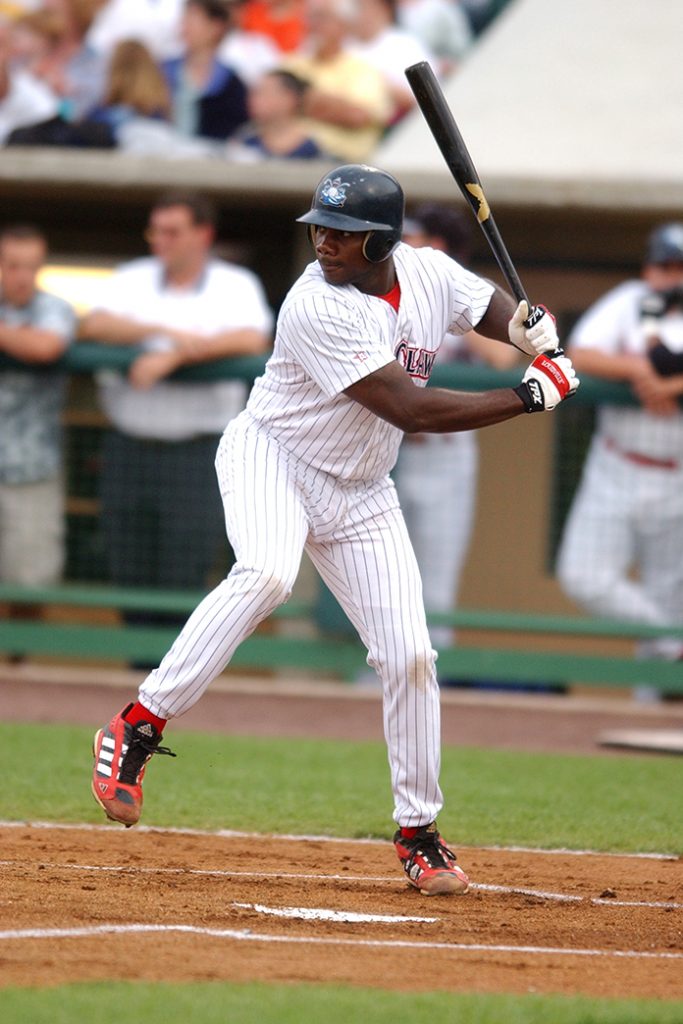
“We will continue to work with Major League Baseball as well as state and Ocean County officials to safely welcome as many fans as possible to the ballpark this summer,” Giombarrese said.
The BlueClaws’ manager is Chris Adamson, the 14th skipper in team history. The Australian, a former catcher, was an All-American at Angelo State University in Texas. Jersey Shore is scheduled to play 120 regular-season games, 60 at home and 60 on the road. SAL members for 19 seasons, the BlueClaws are in Hi-A and the East League for the first time.
“We are looking forward to having a little bit of baseball and getting ourselves into a more normal routine,” said Joe Riccutti, Jersey Shore’s president and general manager. “It feels great to have baseball and our fans back. We in our front office have all spent many years working in this industry and we feel real excited to be able to welcome our team, our fans, our staff and our corporate sponsors back. It was tough not having baseball, but on the plus side we got to spend more time with our families.”
Ricciutti said the team’s game day staff will be larger than usual.
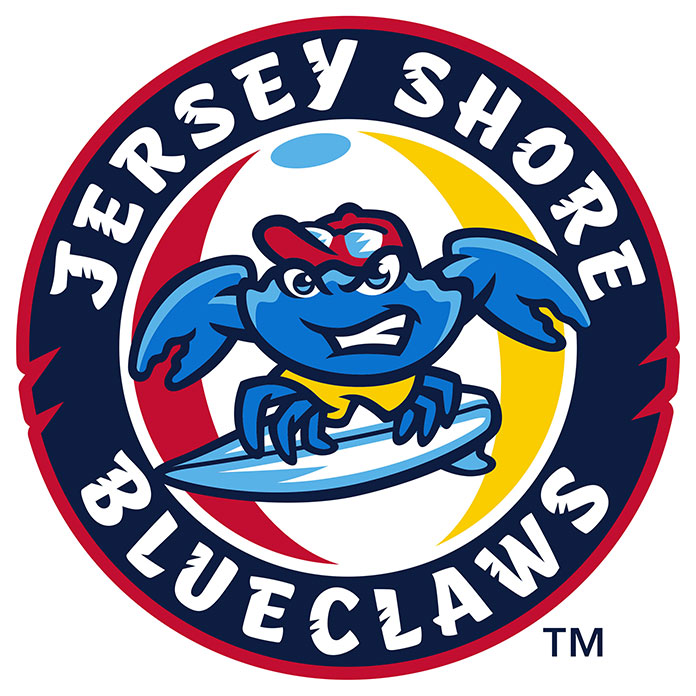
“We will have to utilize additional measures in terms of seating the fans,” Riccutti said. “We will also have more security people than usual. There will be a larger custodial staff as more cleaning will be required. We will activate areas of the concourse for seating. There will be more seating on the berm. If we activate our whole stadium, we will have 3,000-4,000 fans per game. Our seating bowl will be configured in pods. Tickets for pods of 6 by 6 and 8 by 8 can be purchased.
“The idea is to activate additional seating throughout the ballpark in a way that keeps everyone socially distanced. We will have lots of free sanitizers throughout the park.”
Ricciutti said the pandemic has had an impact on the team’s marketing strategy.
“The pandemic changed everything,” he said. “Our usual strategy was to sell as many tickets as possible. Now, we are more strategic with our ticket sales.”
The gate opening times for home games have been changed because of the pandemic. Gates will open at 5:30 p.m. for 7:05 p.m. games. Gates will open at 11:30 a.m. for 1:05 p.m. games. Gates will open at 2:30 p.m. for 4:05 p.m. games. Gates will open at 9:30 a.m. for 11 a.m. games.
It will be the first season for Promozone.
“A lot of our in-game entertainment that had been performed on the field will take place near the boardwalk style amusements or on the concourse because of the restrictions caused by the pandemic,” Ricciutti said. “There won’t be a lot of major changes in terms of the park. Fans will experience a lot more beach themed entertainment such as Jersey Shore Beach Bars. We will rebrand some areas. There will be a handful of new food ideas. All cool stuff. Stay tuned.”



